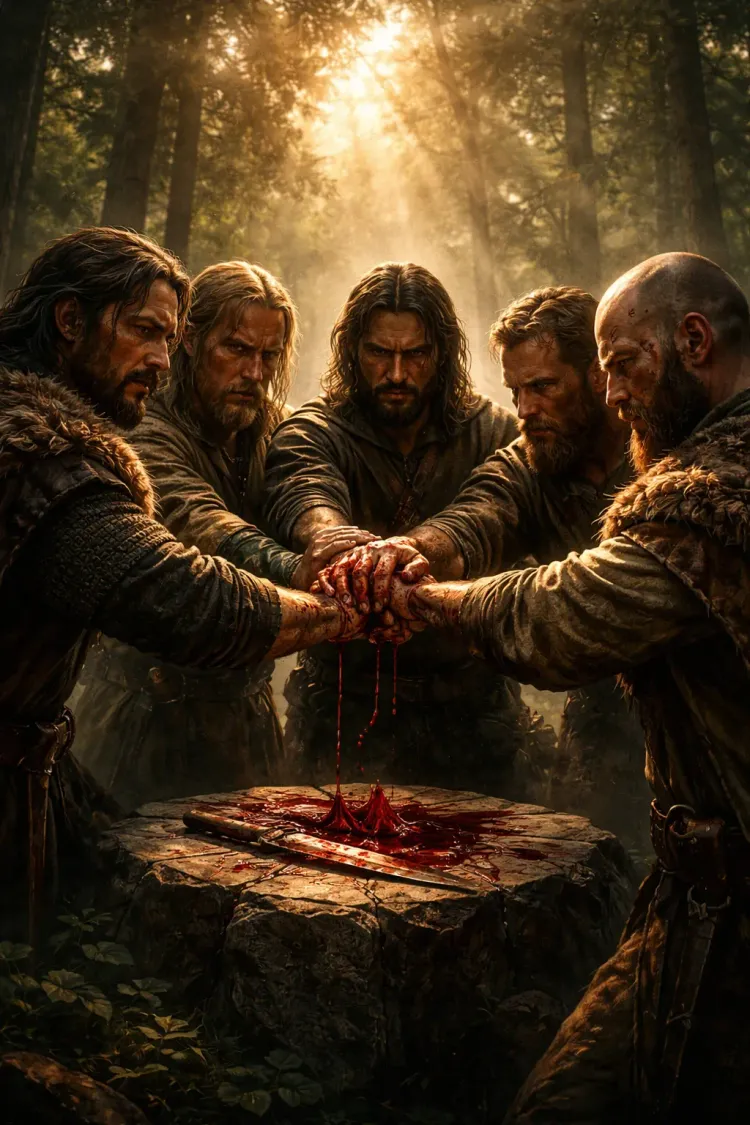There Is No Escape: moving beyond anarchy

By Colonial
The Intellectual Lineage:
Mises → Rothbard → Hoppe
The journey begins with Ludwig von Mises, whose monumental Human Action laid the philosophical sinews of Austrian economics. Mises argued that economics is not a predictive empirical science but a deductive examination of human action—purposeful choices made under scarcity with subjective values. This foundation undergirds all modern claims about the moral and material case for free markets and individual property rights.
From there, Murray Rothbard, Mises’s student, constructed anarcho‑capitalism. For Rothbard, the logic of individual rights and private property—not just limited government—logically entails abolishing the state entirely. In his vision, all public services (including police and courts) would be supplied in a purely voluntary, contractual framework—rendering coercive governance unnecessary and unjustified.
Enter Hans‑Hermann Hoppe, Rothbard’s pupil turned principal critic of liberal democracy. Though he accepts Mises’s praxeology and Rothbard’s property ethics, Hoppe delivers a sobering thesis: among coercive systems, monarchy—termed “private government”—is significantly more productive than democracy, whose short‑term public rulers lack long‑term incentives. In Democracy: The God That Failed, Hoppe argues that monarchs, owning both land and title, defer immediate extraction and invest in their domain, whereas democratic politicians prey and plunder with a 4‑year horizon.
In this chain—Mises to Rothbard to Hoppe—we see not the collapse of one idea, but its unfolding. First human action, then the individual morality of stateless markets, then the problem of political order itself. Each philosopher builds on the other—but each pushes further toward the tension between freedom and control.
Anarchist Movements Are Rebellions, not Revolutions
These economic theories led many of us—bitcoiners, cypherpunks, crypto‑anarchists—to embrace anarchism not merely as a political preference, but as a form of existential liberation. The cypherpunks, in particular, were driven by the belief that cryptographic tools could reclaim personal sovereignty in an age where the state’s surveillance machinery monitors every click, message, and transaction. The intent behind these movements was never utopian escape—it was a strategic dismantling of systemic coercion. They rebelled against a regime that coerced through invisible chains: stifling regulations that suffocate innovation, a tax code designed to extract wealth from producers, inflationary money that silently robs savers, and a bureaucratic labyrinth that ensnares every attempt at autonomous human action. Crypto-anarchism and cypherpunk philosophy offered a toolkit for reclaiming sovereign territory.
The cypherpunks fought some incredibly important battles and gave us valuable tools, but they did not win the war. I posit that they could not. There is no winning if your goal is anarchy, rebellion, resistance, etc. These are all forms of retreat. They are ways to cede territory and pat yourself on the back for it. In order to win, this movement should not be viewed as groups of idealists fleeing into cyberspace; rather, it must be seen as foreign invaders forging sovereign micro-realms within it. We can't be the resistance, or the rebellion, we must be the conquerors - or dare I say, the colonizers.
Resistance is inherently reactive; it acknowledges the opponent's initiative and seeks only to obstruct, not to command. Rebellion, too, is a plea for liberation granted by an external force, hoping that by causing enough disruption, the oppressor will relent. Both mentalities cede the strategic high ground. Victory does not come to those who resist or rebel—it comes to those who assert dominion and impose their own reality.
This is why we must transform from insurgents to sovereign builders. Our enclaves of freedom—digital or physical—must not be seen as retreats from the regime’s reach, but as forward operating bases in a broader campaign of territorial reclamation. Every node, every encrypted message, every self-hosted server is not just an act of defense, but a foothold of governance. We must set our sights not on mere survival, but on rule. For most of us, this will start in the digital realm, but for all of us, the goal must be to advance into the physical.
The doctrine was: make systems of trustless coordination. We believed we could escape: opt out entirely until the Matrix collapsed behind us. We can no longer entertain this fantasy.
Why There Is No Escape
First, land and territory are finite and always contested. Human history is mostly a chronicle of territorial struggle. Millions have been willing to fight and die to determine who controls land. Something like one-quarter to three-quarters of wars involve explicitly territorial disagreement—even over lands with no economic return. Mises' Human Action would have benefitted from an understanding that humans don't just act at random. While it's true that humans "employ means to attain ends", the ends are almost always territorial (and even when the end is not territory itself, it is only from a position of territorial control that any end can be attained). We are biologically programmed, along with all other life on this planet, to obtain and maintain territory from which we can safely reproduce, feed, and enjoy our offspring - or any other pursuit we may imagine. Territory, dominion, control - these are fundamental to the human existence and there can be no freedom without them.
As I've written before, the concept of territory extends beyond the dirt beneath our feet. Rather, it is anything we might exercise control over. For instance, we might imagine digital planes as ethereal, but they are territory nonetheless. Whether physical land, digital space, or cultural value systems, territory is controlled, or at least controllable, and probably contested. Because it is always limited, others will seek to hold and control it. This doesn't even make them bad, it just makes them human. But, if we try to leave the map, we simply cede space to others.
Next, force exists. Power, control, violence, manipulation, etc. They're all a real part of this world and they will be used. Whoever said "the best defense is a good offense" was right. Max Weber (whom I loathe) aptly defined the state as “the human community that successfully claims the monopoly of the legitimate use of physical force within a given territory”. Note here that there are two realms of territorial control exercised by the state. The first is the physical land over which it holds jurisdiction. The second is the hearts and minds of the people who lend legitimacy to the state. It's laws and use of physical force are only "legitimate" because the people believe them to be so. There are good reasons for them to believe it. The physical power the state wields is real. The modern state exercises territorial control over information and, therefore, culture and values. Only through the combination of these two realms is the state able to exist as it does upon the land. It must exercise physical and informational (psychological) force. There is no other way to control territory.
That means power isn’t optional. Someone will use force over territory: from the $5 wrench used by thieves to nuclear escalations between states. Disempowered people don’t self‑regulate—they are overridden. To believe otherwise is liberal naïveté.
Third, there are no rules without rulers. The phrase itself makes logic stare. You may not have considered this, but the idea has been tried before: Enlightenment philosophy once led people to believe that they could erect a system of laws - wielding all the physical force of paper and alphabets - that would eliminate the need for kings. Instead of being ruled by monarchs, the people could be ruled by rules. A Constitution even. They needed a consensus mechanism. Democracy. How's that working out for you?
So If We Can’t Escape… What Must We Do?
We Must Contend for Territory—Digital and Physical. We cannot hide in the void. We must fight for sovereignty, however confined: digital informational territory, private digital economies, and at some point, the physical terrain of existing locales.
Like all good barbarians and colonizers, we start on the frontier. Digital information, code, identity, and capital are currently the open frontier. This battleground didn’t exist until recently, and our enemies—the regime, the “blob”—are rapidly losing control. This is why they seek to implement KYC and age-based regulations. These are desperate attempts to control the digital territory that is slipping through their fingers. Still, we must claim that terrain deliberately. Someone will.
Our tools: encryption, VPNs, bitcoin, monero, self-hosting, privacy tactics, etc.; they are all great weapons. They are not strategy. They are not the will to win and control the territory. We, as human actors, have to develop and employ the latter.
Prepare for Conflict—In Mind and Spirit
If territory must be possessed, we must be rulers, not just rebels under cover. That requires philosophical reframing. We can no longer assume that power, or controlling sovereignty, is immoral. If you control territory but don’t exercise it, you don't control territory and someone else will.
“It is the business of the very few to be independent; it is a privilege of the strong…” Nietzsche warned, “and whoever attempts it… proves that he is probably not only strong, but also daring beyond measure. He enters into a labyrinth… he cannot even go back again to the sympathy of men!”
We must shed last-century moral assumptions rooted in enlightenment liberalism—equality, global democracy, moral universalism. These are illusions that collapse against nature.
If we want freedom, we must take it.
Why Not Choose the Regime’s Rulers? Because the Blob is Not Human
If territory needs rulers, why not reform the current regime, elect better politicians, or lobby for tech‑friendly regulations?
Because the modern regime isn't made of powerful people or elites—it’s a sprawling nexus of perverse incentives or controls and unhinged beliefs made of systems. You might call it “the blob”, “regime”, “geopolitical order”, or our liberal civic religion.
Since the French Revolution, we believed democratization would empower us. Instead, mass enfranchisement created mob-levers, bureaucratic expansion, and socialist pretenses. The resulting ideology holds insane position like money is arbitrary, gender and race constructs are mutable rather than biological, and all individuals are radically equal despite clear disparities in physical prowess, intellect, personal desires, and actual accomplishments.
That ideology is anti-nature—hostile to hierarchy, excellence, meaning. And nature won't abide it. Natural systems eventually reassert: life compacts itself according to competence and capital; rulers arise over degeneracy not by consent of remote voting consoles, but by virtue of real power wielded competently - with an eye to eternal excellence. This may sound radical and even offensive to your modern liberal sensibilities. Hierarchy?! Anathema! But I'm telling you, if we desire to not be slaves to the system, we're going to have to stop thinking like the system. What good was the rule if it brought you to this?
Become Barbarian‑Pilled: Think Like Rulers
This philosophy of rule is not petty authoritarianism—it’s the willingness to defend and control territory. It is sovereignty.
Refuse illusions of escape. Instead, seize, hold, govern, and transform. Remake the world in your image.
Yes, those sound like values of feudal lords and strongmen. But the enemy is mass ideological weak men and networked civil religion. And if Hoppe was right that medieval monarchs were better rulers than democratically elected congressmen and presidents, we must acknowledge the barbarity that established and maintained those old kings. If we cannot bring ourselves to see the virtue in that, to recognize the foundation of civilization, what is it that holds us back? What moral framework would lead us to degeneracy and weakness over strength, honor, and expanding power?
Nietzsche urged the revaluation of all values—to overthrow those values which valorize weakness and equality over excellence and power:
“And whoever attempts it… cannot any longer go back.”
Let us internalize that ambition. We fight to win. When asked what is best in life, Conan the Barbarian famously said:
“To crush your enemies, see them driven before you, and to hear the lamentation of their women!”
This seemingly comical quote from a fantasy novel is more true than we might want to admit. We were born to seize territory. To own it. Control it. It takes a sort of barbarism that is unattractive to our modern morality, but if we can overcome ourselves, we will find a freedom our parents and grandparents could never imagine.
We cannot escape the regime. We cannot retreat forever. We must take territory, digital and physical; fight for sovereignty; and, where we preside, be responsible rulers—not for the sake of power itself, but for the sake of freedom and the ability to create the world as we desire it for ourselves and our posterity.
This is not the dream of the poet. It is the demand of history and nature.





